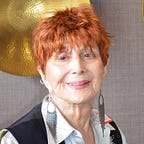Nixon’s Veto of Day Care Bill Dismays Rep. Louise Day Hicks
A critical need for Working Moms, Welfare Moms, Their Children, Too
WASHINGTON, September 14, 1971: “The most frightening experience a woman can have is to find herself a widow,” said Louise Day Hicks, Democratic Congresswoman from Massachusetts, whose husband died of cancer three years ago. Her advice to new widows: “Immediately go out and seek a position, even if it means going back to school first. It will be a lifesaver.”
Mrs. Hicks, 52, has worked all her married life, beginning as her father’s law clerk, and since then as a partner in a law firm with her brothers. She served as treasurer and chairman of the Boston School Committee, and was Boston City Councilor when Speaker of the House John W. McCormack retired, leaving the 9th District House seat vacant.
Although she’d already been trounced in her campaign for Mayor of Boston in 1967, she nerved herself to run for Congress: even after she won, last year, she worried about coming to Washington alone and setting up an apartment.
Friends here eased the move, and her work has absorbed her considerable energies. She said, “My life is full. But I’ll never be able to bridge the gap left by John’s death. He was my real love.” Kind friends have tried to introduce her to eligible men. “But I don’t think of myself as single. I’m seeking no further matrimony.”
She has learned to have widowed women as friends, rather than couples. “It hurt me to go out with people we used to see when John was alive. The man is expected to escort you, as well as his wife, to dance with you. It’s awkward. I don’t need that aggravation.”
Mrs. Hicks supported the just-passed Equal Rights Amendment as “the only way women can have truly equal rights with men,” and she understands the women’s movement. “I applaud these women. They should have their place in the sun.
“I’m not for abortion,” (as some of them are) she noted, “but perhaps that’s because I’m older. I’ll never need an abortion,” she said with a small smile.
A member of the House Education Committee as well as the Labor and Veteran’s Affairs Committee, Mrs. Hicks, was “dismayed when the President ( Richard Nixon) vetoed the child care bill. We are going to try to introduce it again.”
She believes the working parent needs day care facilities as much as the welfare mother does and she deplores the attitude of critics who look on day care as necessarily custodial. “No part of the bill took away the rights of the parents and there was a great deal in it concerning the welfare and the development of the whole child.”
As a working mother — her sons are now 25 and 26, and she has three grandchildren — she says, “I was lucky to have living with me when the children were babies the same woman who took care of me when I was a little girl.” And working with her father enabled her to juggle her hours so she could be home at crucial times. She feels that “it’s up to a woman whether or not she works, but her family must come first. And that’s where day care centers can come in.”
“It’s distasteful to me that women have allowed themselves to be so protected with no thought of their own,” said Mrs. Hicks who is fiercely opinionated. And nowhere has she taken a stronger stand than on the controversial subject of busing. Although the climate on the issue has changed and the anti-busing proponents are getting some strange bedfellows, Mrs. Hicks got ethnic groups in the Boston area furious years ago by her opposition.
“All I ever said,” she remarked recently, “is I believe in neighborhood schools for my children. But I believe in quality education. I don’t think we should use busing as a smoke screen for bad education.” Lately, she said “the impact of busing has touched many people. You hear from mothers, left and right, saying, ‘I want my children near home’.”
But Mrs. Hicks thinks there are risks to busing other than long rides. “You take deprived children and mingle them with children not their peers and you create a traumatic experience,” she said. She believes in integrated schools “but I don’t think it will be achieved by forced busing. I don’t think something works if you do it forcibly.”
An alternative to busing would be taking school children to museums and other public places “to give them the integrated experience,” she said.
Although others have said she lost the mayoralty race because of her position on busing, she believes she lost because of her sex. “The Italians, of which there are many in Boston, believe an Italian and a man should be the head of the family and the head of the city.”
“I think it will be a long time before a woman becomes the mayor of a big city.”
[This article originally appeared in The Washington Daily News, September 14, 1971 as Louise Day Hicks Sticks to Her Opinions. #20 in a collection of more than 100 newspaper articles by Judy Flander from the second wave of the Women’s Movement reflecting the fervor and ingenuity of the women who rode the wave.]
